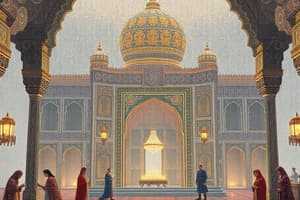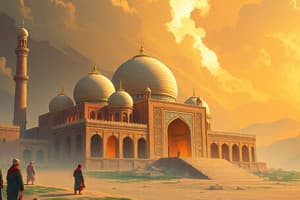Podcast
Questions and Answers
¿Cuál fue uno de los aspectos más destacados de las campañas militares de Mahoma?
¿Cuál fue uno de los aspectos más destacados de las campañas militares de Mahoma?
- Su impulsividad y falta de disciplina.
- Su astucia, disciplina y brillantez estratégica. (correct)
- Su falta de planificación y confusión en el liderazgo.
- Su crueldad y despiadada estrategia.
¿Cuál fue el legado más perdurable de Mahoma según el texto?
¿Cuál fue el legado más perdurable de Mahoma según el texto?
- Su legado como fundador del Islam. (correct)
- Su impacto en la sociedad árabe.
- Su destreza militar.
- Su liderazgo político.
¿Qué aspectos enfatizaba Mahoma para la práctica del Islam según el texto?
¿Qué aspectos enfatizaba Mahoma para la práctica del Islam según el texto?
- La creencia en varios dioses.
- La adoración de múltiples dioses.
- La importancia de la sumisión a Alá y el cumplimiento de cinco deberes básicos. (correct)
- La importancia de la caridad y la peregrinación.
¿Qué aspecto de las enseñanzas de Mahoma sigue inspirando a millones de personas en todo el mundo?
¿Qué aspecto de las enseñanzas de Mahoma sigue inspirando a millones de personas en todo el mundo?
¿Qué aspecto del legado de Mahoma ha tenido un impacto profundo en la historia según el texto?
¿Qué aspecto del legado de Mahoma ha tenido un impacto profundo en la historia según el texto?
¿Cuál fue el papel más destacado de Mahoma como líder político?
¿Cuál fue el papel más destacado de Mahoma como líder político?
¿Cuál fue el logro más significativo de Mahoma en la unificación de los pueblos árabes?
¿Cuál fue el logro más significativo de Mahoma en la unificación de los pueblos árabes?
¿Qué aspecto clave de las enseñanzas islámicas influyó en la unificación de las tribus árabes?
¿Qué aspecto clave de las enseñanzas islámicas influyó en la unificación de las tribus árabes?
¿Qué función desempeñaron las habilidades militares de Mahoma en la expansión de la comunidad árabe?
¿Qué función desempeñaron las habilidades militares de Mahoma en la expansión de la comunidad árabe?
¿Cuál era el objetivo principal de Mahoma como líder político?
¿Cuál era el objetivo principal de Mahoma como líder político?
¿Cómo influyó el carisma de Mahoma en su papel como líder político?
¿Cómo influyó el carisma de Mahoma en su papel como líder político?
Flashcards are hidden until you start studying
Study Notes
Mahoma: A Pivotal Figure in Arab History
Mahoma, also known as Muhammad, was a transformative figure in the history of the Arab world. Born in 570 CE in Mecca, he would become a political leader, a unifier of Arab peoples, a military strategist, and a foundational figure for the Islamic faith.
Political Leader
Mahoma's role as a political leader was a natural extension of his vision for a unified and prosperous society. He sought to reform the tribal factionalism that had long plagued the Arabian Peninsula, emphasizing the common values and duties of humanity. Mahoma's influence as a political leader grew steadily as more tribes embraced his cause, attracted by his charisma and the promise of a better life.
Unification of Arab Peoples
Mahoma's greatest accomplishment was the unification of the diverse tribes of Arabia under a single banner. This unification was facilitated by his ability to form connections with tribal leaders and his advocacy for a shared religious identity. Mahoma's vision for a society built on the principles of equality, justice, and compassion enabled the Arab tribes to set aside their differences and work towards a common goal.
Military Leader
Mahoma's military acumen and strategic insights played an integral role in the success of the Arab community's expansion. He led the Muslim army to numerous victories against the Byzantines, Persians, and local Arab tribes that resisted the progress of Islam. Mahoma's military campaigns were marked by their shrewdness, discipline, and strategic brilliance.
Islamic Teachings
Mahoma's most enduring legacy is his role as the founder of Islam, a faith that he shaped through his teachings, actions, and example. Mahoma's vision for Islam was one that emphasized the importance of submission to Allah, the practice of five basic duties (prayer, fasting, charity, pilgrimage, and belief in one God), and the establishment of a just and equitable society. Mahoma's teachings provide a framework for the practice of Islam that continues to inspire millions of people around the world.
In summary, Mahoma was a remarkable figure whose impact on the Arab world was profound. His political leadership, military prowess, and religious teachings have left an indelible mark on history, and his legacy continues to influence the lives of millions of people.
Studying That Suits You
Use AI to generate personalized quizzes and flashcards to suit your learning preferences.




